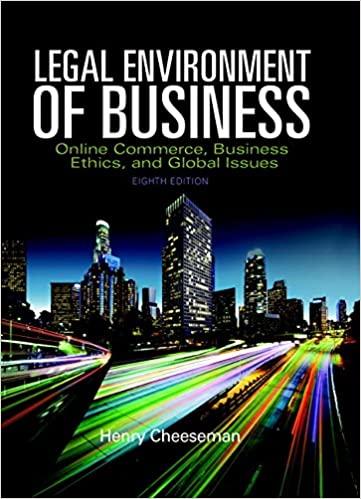Question
Which of these statements are true? Please explain why it is false thank you :) 1. Diligence is the failure to observe that degree of
Which of these statements are true? Please explain why it is false thank you :)
1. Diligence is the failure to observe that degree of care, precaution and vigilance that the circumstances justly demand.
2. There is negotiorum gestio when the manager has been tacitly authorized by the owner.
3. If a person obliged to do something does it in contravention of the tenor of the obligation, the same shall be executed at his cost.
4. If the object of obligation is a generic thing, the loss or destruction of anything of the same kind even without the debtor's fault and before he has incurred in delay will not have the effect of extinguishing the obligation.
5. Where the obligation consists in the payment of money, the failure of the debtor to make payment even by reason of a fortuitous event shall not relieve him of his liability.
6. If the fulfillment of a potestative condition depends exclusively upon the will of the creditor, the conditional obligation shall be valid.
7. If the suspensive condition is fulfilled, the obligation is extinguished.
8. A principal obligation may exist without an accessory obligation but an accessory obligation cannot exist without a principal obligation.
9. The action for annulment of contracts shall be extinguished when the thing which is the object thereof is lost through the fraud or fault of the person who has a right to institute the proceedings.
10. An obligation to pay money is generic; therefore, it is not excused by the fortuitous loss of any specific property of the debtor.
11. The effect of annulment of the contract is to wipe it out of existence, and to restore the parties to their original situation before the contract was entered into.
12. Ratification requires the conformity of the contracting party who has no right to bring the action for annulment.
13. The determination of the performance may be left to a third person, whose decision shall not be binding until it has been made known to one of the contracting parties.
14. Laws in force at the time the contract was made generally govern its interpretation and application.
15. A contract containing a condition which makes its fulfillment dependent exclusively upon the uncontrolled will of one of the contracting parties, is valid.
16. Business advertisements of things for sale are not definite offers.
17. A contract may not be annulled on the ground of vitiated consent, if the act complained of is committed by a third party without the connivance or complicity of one of the contracting parties.
18. As a rule, it is only a mistake of fact which will vitiate consent thus rendering the contract voidable.
19. When all the essential requisites are present, a contract is obligatory in whatever form it may have been entered into.
20. An error so patent and obvious that nobody could have made it, or one which could have been avoided by ordinary prudence, cannot be invoked by the one who made it in order to annul his contract.
21. A threat to enforce one's claim through competent authority, if the claim is just or legal, vitiates consent.
22. The rule is that a construction that would render a provision inoperative should be avoided; instead, apparently inconsistent provisions should be reconciled whenever possible as parts of a coordinated and harmonious whole.
23. The interpretation of obscure words or stipulations in a contract shall not favor the party who caused the obscurity.
24. It is a cardinal rule in contract interpretation that the ascertainment of the intention of the contracting parties is to be discharged by looking to the words they used to project that intention in their contract, that is, all the words, not just a particular word or two, and words in context, not words standing alone.
25. When it is absolutely impossible to settle doubts, and the doubts refer to incidental circumstances of a gratuitous contract, the least transmission of rights and interests shall prevail.
26. For absentees, prescriptive period is within four years from the time the domicile of the absentee is known.
27. The purpose of rescission is to repair the defect in the consent.
28. Rescissible contracts remain legally effective until set aside in a rescissory action and may convey title.
29. That a contract void at inception can be validated by ratification or prescription and certainly can be binding on or enforceable.
30. No damages may be recovered on the basis of a void contract; being nonexistent, the agreement produces no juridical tie between the parties involved
Step by Step Solution
There are 3 Steps involved in it
Step: 1

Get Instant Access to Expert-Tailored Solutions
See step-by-step solutions with expert insights and AI powered tools for academic success
Step: 2

Step: 3

Ace Your Homework with AI
Get the answers you need in no time with our AI-driven, step-by-step assistance
Get Started


